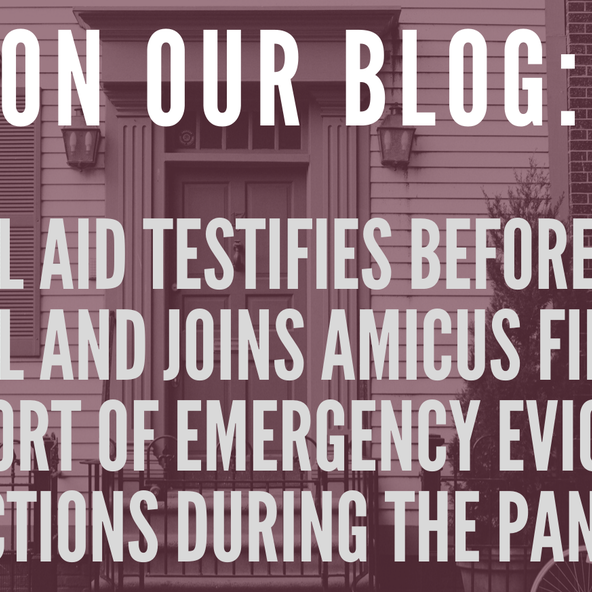
This past Thursday, the D.C. Council’s Committees on Judiciary and Public Safety, Housing and Executive Administrative, and Human Services held a joint public oversight roundtable to examine the impact of emergency legislation that was enacted in the early months of the pandemic to protect tenants from actual evictions, new eviction case filings, and new eviction notices. The aim of these measures was to keep as many District residents as possible in stable housing throughout the pandemic, preventing displacement and additional spread of COVID-19.
Legal Aid testified at this roundtable alongside tenants, tenant organizers, other legal services providers, and national experts. As we shared with the Council, the various evictions moratoria provide comprehensive protections for tenants but now are at risk because of a D.C. Superior Court judge’s ruling finding the eviction filing moratorium unconstitutional. If this ruling stands, or if the ruling is used to invalidate other parts of the Council’s emergency response, tenants will face serious, imminent, and irreparable harm.
Thousands of tenants across the District remain at imminent risk of eviction, with sharp disparities falling along racial and income lines. Without a moratorium on new eviction cases or notices, many tenants who receive such papers would simply move out rather than face the court process, leading to displacement and community spread of COVID-19. A study in Milwaukee by eviction expert Matthew Desmond found that 34% of tenants left when they received an eviction notice, including because of other steps some landlords take to threaten and harass tenants into giving up their homes.
Craig Pollack, Associate Professor at Johns Hopkins University Bloomberg School of Public Health and the co-author of a study on eviction moratoria and COVID-19 transmission, testified about what happens when state eviction moratoria lapse. The study found that states that lifted their eviction protections experienced a significant increase in COVID-19 cases and deaths, translating into an extra 433,000 COVID-19 cases and an excess of 10,700 deaths nationally. Kay Jowers, Senior Police Associate at Duke University, co-author of a study that looked at the efficacy of eviction and utility disconnection moratoria to reduce COVID-19 infections and deaths, also testified. That study found that eviction and utility disconnection protections significantly reduced COVID-19 infections and death, resulting in a decrease in cumulative infections by 3.8% and deaths by 11%. She stated that these types of temporary, emergency measures not only benefit those facing housing insecurity, but also the entire community, by protecting public health and reducing infections and deaths for everyone.
Participants in the roundtable also emphasized the extreme stress and anxiety experienced by tenants when they receive an eviction notice or complaint and are forced to defend themselves in court. Craig Pollack testified that the lapse of evictions moratoria, in states that had previously blocked the notice and filings stages of eviction, resulted in a significant increase in mental distress for renters.
For tenants forced to defend their homes in court, many struggle to do so in a remote environment. Tenants with limited access to technology and high-speed internet often must join remote court hearings by telephone, a disempowering experience with high potential for error. Furthermore, the mere filing of an eviction case can cause lasting damage to families as they search for new housing. As an article in Monday’s Washington Post observed: “Eviction hits a tenant with the blunt force of dislocation; its second act, however, is a years-long slow burn of shrinking options. Credit scores tank. Court records scare off prospective landlords. The stigma, what a legal scholar has termed a “modern-day scarlet letter,” sticks.”
Not only will the lifting of the eviction moratoria cause irreparable harm to thousands of District renters, it may also rob tenants of the opportunity to receive rental assistance and avoid court altogether. During the roundtable, Legal Aid testified about the many problems our clients are having with accessing these vitals funds. The District soon will receive another $200 million in federal funds for rental assistance, but it may take months for this assistance to reach landlords and protect tenants. A premature lifting of the eviction protections will only shorten the amount of time tenants have to access these programs. This will lead to unnecessary case filings, the ramifications of which will extend far beyond the current crisis. Matthew Desmond’s research shows that tenants with eviction records often are forced into substandard housing and are 25-35% more likely to be forced into housing with serious code violations when they move.
In addition to public testimony, Legal Aid along with Bread for the City, the D.C. Bar Pro Bono Center, Legal Counsel for the Elderly, the Neighborhood Legal Services Program, and Rising for Justice, filed an amicus memorandum and declaration in D.C. Superior Court on Friday in support of a motion filed by the District government seeking a stay pending appeal – an order to put the ruling that the eviction moratorium is unconstitutional on hold, while an appeal of that decision proceeds. Our filing provided data, client stories, and provider experiences that demonstrate the importance of the District’s current moratorium on the filing of new eviction cases.




